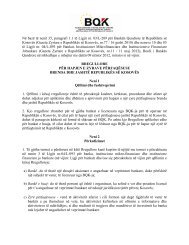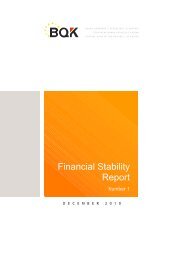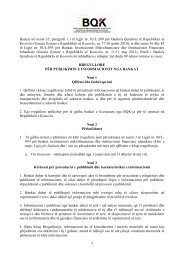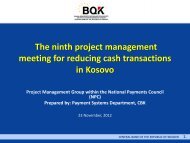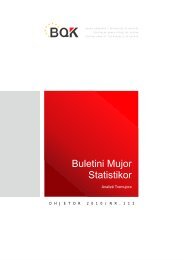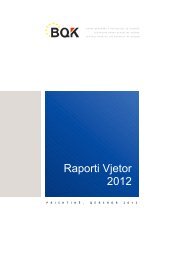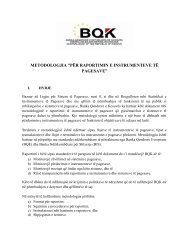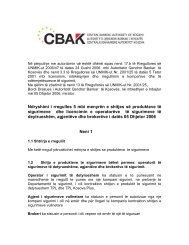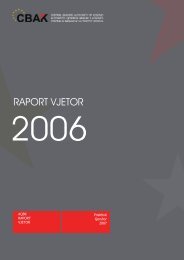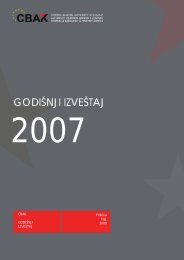financial stability report - Banka Qendrore e Republikës së Kosovës
financial stability report - Banka Qendrore e Republikës së Kosovës
financial stability report - Banka Qendrore e Republikës së Kosovës
Create successful ePaper yourself
Turn your PDF publications into a flip-book with our unique Google optimized e-Paper software.
Number 3<br />
Financial Stability Report<br />
Kosovo's banking system continues to be characterized by a high degree of capitalization<br />
and capital quality. Capital adequacy ratio (CAR) remains at 17.2 percent, significantly<br />
exceeding the 12 percent minimum required by the CBK. Moreover, 60 percent of the total<br />
capital consists of the share capital. The indicated high level of capitalization and capital<br />
quality do point to the <strong>stability</strong> of Kosovo’s banking system and its satisfactory ability to<br />
cover potential losses from external shocks. In addition, the satisfactory sustainable<br />
position of the system is confirmed by stress-test analysis, the results of which show that<br />
the banking system in Kosovo, in general, would be able to cope with “extreme” scenarios of<br />
liquidity, credit, exchange rate, and interest rate risks. More specifically, the results<br />
suggest that Kosovo's banking system would be able to withstand high degrees of<br />
hypothetically instant deposit withdrawal rates, with the current level of liquidity.<br />
Additionally, due to the high level of capitalization, Kosovo's banking system appeared able<br />
to cope with the considerable potential increase in the level of non-performing loans, in<br />
which case the need for recapitalization would arise to only a few individual banks. On the<br />
other hand, the banking system's exposure to currency and interest rate risks continues to<br />
be marginal, due to the low presence of flexible interest rate loans and deposits and low<br />
level of foreign currency loans.<br />
The infrastructure of the existing banks, albeit with a slower growth trend of branches and<br />
sub-branches expansion, has continued its overall expansion - thus further increasing the<br />
quality and volume of banking services accessed by citizens and businesses. Significant<br />
contribution to the increased quantity and effectiveness of banking services has been made<br />
by the continuous expansion of the ATM network and POS devices, which enable payment<br />
processing at the points of sale. Although these services are growing at a fast pace, Kosovo<br />
lags behind in the level of development and usage of electronic banking services compared<br />
to the region. The development of the payment system has advanced in terms of both<br />
increased security and sustainability, as well as increased efficiency. The number and value<br />
of transactions processed through the Kosovo payment system has increased, along with<br />
the increased payment security and sustainability supervisory measures. The issuance of<br />
securities by the Government of the Republic of Kosovo, which commenced in January 2012<br />
and for which the CBK acted as government’s fiscal agent, had a significant impact in<br />
increasing the number of transactions processed through the payment system. It also<br />
marked a significant increase in Kosovo’s <strong>financial</strong> sector <strong>stability</strong> and efficiency, thus<br />
setting the grounds for country’s capital market development. The CBK is also in the final<br />
stage of development of a more advanced payments’ system (RTGS system) which enables<br />
real-time settlement of urgent and systemic payments between banks and local government<br />
institutions, thereby reducing the potential risks from delays in settlements.<br />
Other Financial Institutions, which in June 2012 accounted for 25.4 percent of total<br />
<strong>financial</strong> sector assets, consist of pension funds, insurance companies, microfinance<br />
institutions and <strong>financial</strong> auxiliaries. Kosovo’s pension system assets, most of which are<br />
managed by the Kosovo Pension Savings Trust (KPST), marked an annual growth of 19.5<br />
percent, amounting to 659.1 million euros. Most of these assets consist of investments in<br />
overseas shares, the price of which increased over the observed period, and of investments<br />
in overseas securities, which account for a significant share. In 2012, KPST invested 5<br />
percent of its assets in the domestic market by placing deposits in commercial banks in<br />
Kosovo, thus increasing the money supply in the market. The assets of insurance<br />
companies also marked a significant increase of 16.3 percent, amounting to 120.2 million<br />
euro in June 2012. Nevertheless, their profit halved, falling to 0.6 million compared with<br />
16 |



